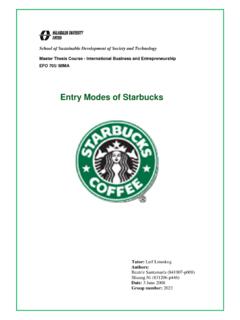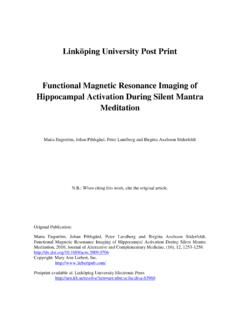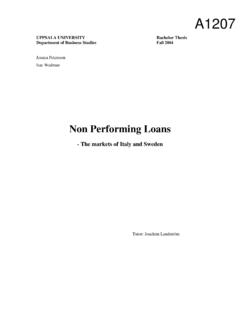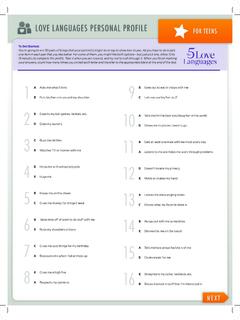Transcription of Using the Internet in Education Strengths and Weaknesses
1 Using the Internet in Education Strengths and Weaknesses A Qualitative Study of Teachers Opinions on the Use of the Internet in Planning and Instruction Camilla Br ndstr m 2011 Examensarbete, kandidatniv , 30 hp Engelska med mnesdidaktisk inriktning L rarprogrammet 90 hp Handledare: Dr Tore Nilsson Examinator: Dr Alan Shima 1 Acknowledgements The author would like to thank the participants of this study, the five teachers whose informative input and unique perspective made this research project possible. The author would also like to thank Dr Tore Nilsson for invaluable guidance and support during the research process. 2 Abstract The Internet plays a significant role in the lives of young people today. Previous research points to advantages as well as disadvantages of the use of the Internet in a formal educational context.
2 The aim of the current study was to investigate the influence of the use of the Internet on planning and instruction. Five upper secondary school teachers were interviewed face-to-face. Five recurrent themes were identified in the interview data: general opinions on and experience of the Internet , attitudes to teaching and learning, opinions on the use of the Internet as a planning and teaching resource, effects of the use of the Internet on students and teachers, and drawbacks of the use of the Internet in the school. It was found that the teachers think that the Internet is a valuable source of information and an important additional teaching tool. The Internet can motivate the students, make teaching more fun, and allows variation in teaching. Four major drawbacks of the use of the Internet were reported by the teachers, viz.
3 Students' cheating, unreliable information, technical problems, and students' extracurricular activities during lessons. Key words: the Internet , the qualitative interview, young people, upper secondary school, English teachers, recurrent themes, additional teaching resource. 3 Table of contents Introduction 5 Aim and research questions 6 Thesis statement 7 Theoretical framework 8 Benefits and drawbacks of the use of the Internet in formal Education 8 Practical guidelines for teachers on the use of the Internet in the school 11 Student and student teachers' opinions of the use of the Internet 13 Previous studies on teachers' opinions on the use of the Internet 14 An American perspective 15 A British perspective 16 A Canadian perspective 17 A Swedish perspective 18 Preconditions for teaching and learning in the Aland Islands 20 The curriculum at the upper secondary school level 20 Internet -based learning and teaching 21 Method 22 The research procedure 22 Methodological concerns 24 The informants 26 Discussion of the results
4 27 The analysis of the interviews 27 General opinions on and experience of the Internet 27 Attitudes to teaching and learning 29 Opinions on the use of the Internet as a planning and teaching resource 30 4 Effects of the use of the Internet on students and teachers 33 Drawbacks of the use of the Internet in the school 35 Evaluation of the interview guide 39 Methodological concerns revisited 40 Summary and conclusion 42 Works cited list 52 Appendix 55 Appendix 1: information sheet 55 Appendix 2: interview guide 56 5 Introduction The best of all possible worlds would be for computers and the Internet to become part, and probably only a small part, of a thriving academy of motivated learners whose time in cyberspace is significantly exceeded by time spent reading, visiting interesting places and people, having fascinating conversations, helping their peers, developing their physical and artistic talents, and enjoying life.
5 ( chapman 2005:342) The Internet plays a major role in the lives of young people today. Children and youngsters engage in online activities both inside and outside the classroom (Sefton-Green 2004). Formally, that is in the school, young people use the Internet for instance, when searching for information and when completing tests. Informally, that is in their spare time, they chat with friends, play online computer games and are involved in fan fiction, Using published material to create pictures and films etc. (Olin-Scheller & Wikstr m 2010). Christina Olin-Scheller and Patrik Wikstr m contend that fan fiction forums on the Internet could be considered informal learning settings (Olin-Scheller & Wikstr m 2010:41). In fan fiction young people not only consume culture, but also produce it themselves. Original characters and settings in films/stories (for instance, Harry Potter) are transformed into another fictional context whereby a new story is created.
6 The author of this new narrative publishes his/her text online, which makes it available to a worldwide audience of editors/critics. Thus, fan works give young people the possibility to expand their knowledge sphere and to interact and collaborate with other young people (41-43). Moreover, fan fiction web sites give young people the opportunity to experiment with different identities (Jewitt 2010; Olin-Scheller & Wikstr m 2010). Olin-Scheller and Wikstr m further discuss the generation gap that exists between students and teachers nowadays. Young people have been brought up in the digital era, whereas adults have 6 gained their skills in ICT later in life. Consequently, there is generally a 'digital knowledge gap' between a teacher and his/her students (43). Taking this issue one step further, however, it follows that young people who regularly surf the Internet are exposed to incorrect use of the English language from a prescriptive point of view.
7 How does the continual use of the Internet influence students' language skills? Moreover, how should teachers handle ESL (English as a Second Language) and EFL (English as a Foreign Language) students' exposure to incorrect language use? This circumstance creates a possible conflict between the formal and the informal side of language in the classroom. For instance, one of the teachers in the current study expresses concern over the fact that students think that skills in informal language use is more important than knowledge in formal language use. Aim and research questions The major aim of the current study is to investigate if and how the Internet is used as an educational tool, that is, as a complement to teachers' use of the national curriculum, (course) literature, newspapers, films, tapes etc. in their short-term course/lesson planning and English teaching.
8 The study will focus exclusively on the perspective of English teachers working in upper secondary schools in the Aland Islands. An aspiration I have is to be able to suggest classroom practices for teachers who wish to benefit from Using the Internet in their everyday work (based on my interview data). As Rachel A Karchmer (2001) argues, teachers can learn a great deal from other teachers who regularly use the Internet in instruction. The research questions of this study are: Can teachers benefit from Using the Internet in their English classes; when planning lessons/projects, constructing tasks, promoting student motivation If so, what are the advantages? Are there any side effects to the use of the Internet in lesson/course planning and teaching? If so, what are the drawbacks? The current study is a pilot study within an ongoing research project at H gkolan i G vle, Learner English: development of multi-literacies and patterns of language use in formal and 7 informal learning contexts.
9 The overall purpose of this larger research project is to compare teenagers' written English produced in Internet -based contexts with their written English produced in the school. As a part of this larger project, another aim of the current study is to test and evaluate an interview guide (see appendix 2). Thesis statement Today teachers worldwide are encouraged and expected to implement Information and Communication Technology (ICT) in instruction (Gibson & Oberg 2004). However, teachers might find it difficult to know how to use the Internet in the classroom (Tuv r & Blomqvist 2009). One reason is that the environment that teachers work in undoubtedly has an impact on their work, in particular if access to the Internet is readily available or not at their school (Madden et al 2005). Another reason could be that teachers lack knowledge/experience of and familiarity with ICT.
10 According to Song l Kilimci (2010), teachers might find it difficult to use ICT in their classrooms due to the rapid technological development. Yet another reason could be insufficient command of the English language, which forces teachers to want to control their teaching. Thus, teachers' awareness (of their linguistic deficiencies) might have an impact on their work. The thesis statement of the present study is that it is of utmost importance that teachers are familiar with modern technology, and moreover that they can benefit from Using the Internet as an additional teaching resource. Previous studies/literature in the field confirm this hypothesis (Acikalin, 2009; Cunningham & Andersson 1997; Dudeney 2007; Gibson & Oberg 2004; Gray et al 2007; Harmer 2007; Karchmer 2001; Kennedy 2010; Kilimci 2010; Kuo 2008; Madden et al 2005; Muehleisen 1997; Sayed Abdallah 2007; Sharples et al 2008; Singhal 1997; Tuv r & Blomqvist 2009; Young 2003).















